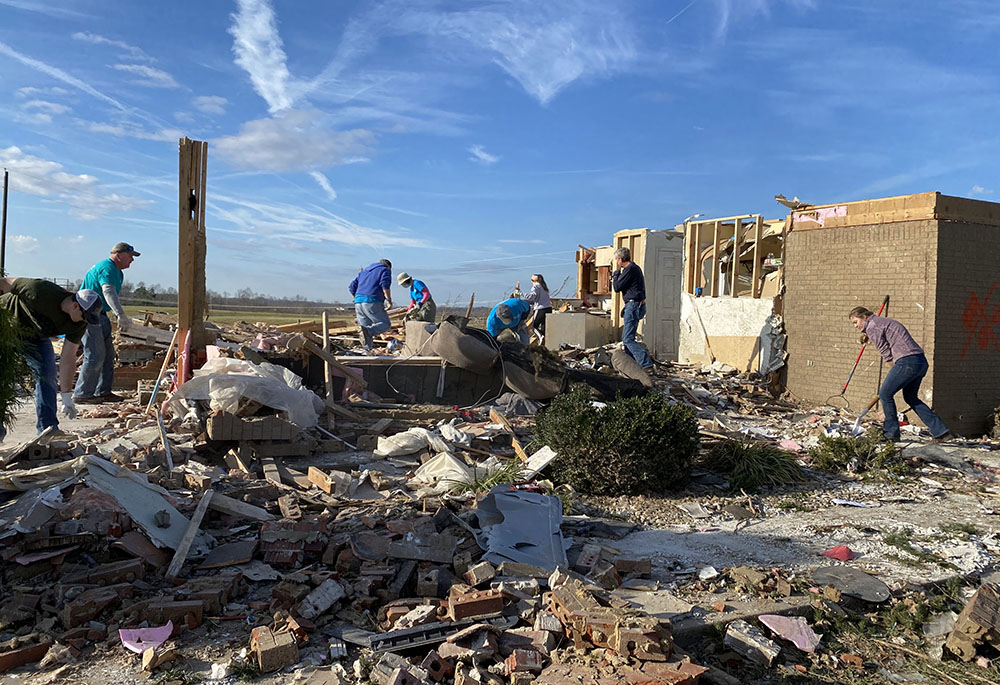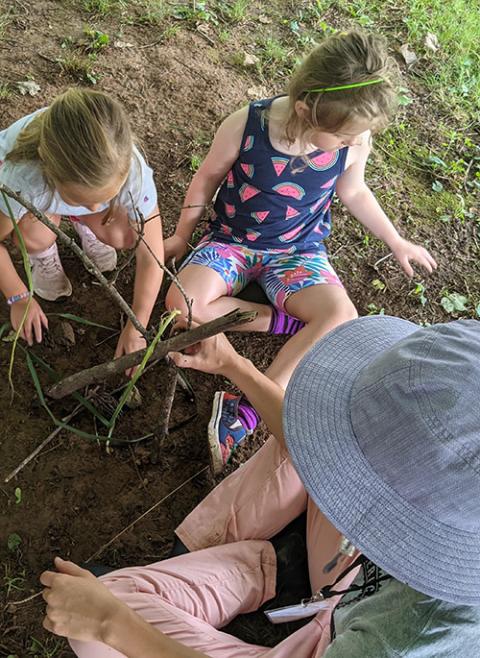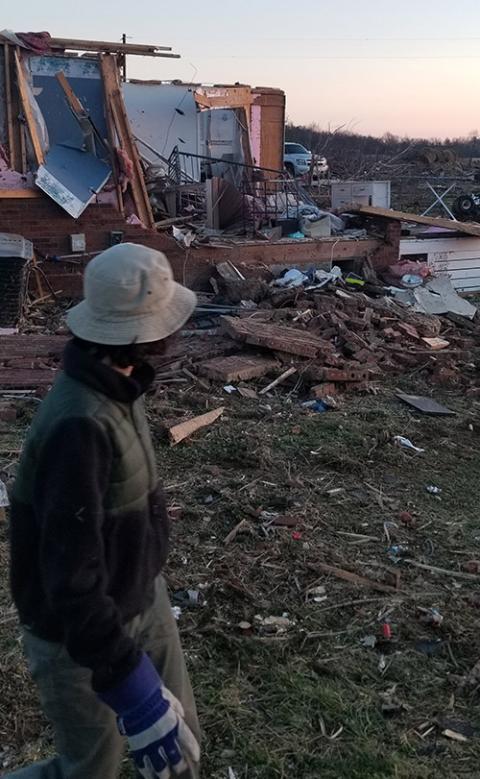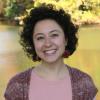
Volunteers with the Sisters of Charity of Nazareth sort through and clear debris from a home severely damaged by tornadoes in Campbellsville, Kentucky, accompanied by the surviving family and friends. (Courtesy of Ellen Sprigg)
Editor's note: Notes from the Field includes reports from young people volunteering in ministries of Catholic sisters. A partnership with Catholic Volunteer Network, the project began in the summer of 2015. This latest round of the series features volunteers in Orange, California; Nazareth, Kentucky; and New York City. Read more about Julia here.
As a person who struggles with anxiety, the technique of "grounding" is an important coping mechanism in my life, connecting me to my body and to the Earth. There's something healing about being rooted in place.
As I returned to my childhood home — in northern Kentucky — for the holidays, I was reminded of the irony of returning in 2020 to my home state to live. You see, having grown up and attended primary and high school in Kentucky, I vowed to pursue higher education out of state and never return … which I did, attending college in Missouri, only to return to "my old Kentucky home" for these years of service.
It's not that I hold anything against this place; I'm just a dreamer enamored by the idea that life happens globally, "out there." My time living and serving with the Sisters of Charity of Nazareth, however, has reminded me that life and change happen just where we are, so long as we have a heart and eyes to see it.

Julia Gerwe (bottom right) engages students of the St. Joseph Montessori Children's Center in Bardstown, Kentucky, in nature play, fostering their connection to nature and to place. (Courtesy of Jane Rudnick)
I've reflected often on this idea of "being connected to place" through my work in ecological sustainability. So often in the semi-rural and rural communities where I serve, feeling connected to place translates to caring about and wanting to protect the environment, in support of the Sisters of Charity of Nazareth's mission. Getting children out in nature, learning to not be afraid of insects, inspires a future in which they plant pollinator gardens that combat the current crisis of habitat and species loss and vote for political representatives who will prioritize similar values. See the picture? Global.
This theory and my own connection to my current physical place changed, however, on Dec. 10, 2021, when a torrent of tornadoes devastated the western part of Kentucky and several neighboring states. So many experienced inexplicable loss and grief followed by, throughout the region, a sleepless and stressful night sheltered in place. I remained awake most of the night, anxiously awaiting storm sirens and checking my phone for weather alerts; but here I was in Nazareth, alive with a home intact, in the morning light. How was I different from my neighbors in Campbellsville, 50 minutes south, whose homes were destroyed? I wasn't different, and I'm still not. Together, we're connected by place. My heart told me I had to respond.
Thankfully, I wasn't alone. The Sisters of Charity of Nazareth have been responding through their Disaster Relief Team since 2011. They were "guided by the spirit" in the beginning — so says Sr. Luke Boiarski, director of the order's Lay Mission Volunteer Program — and remain guided by the spirit today. In mid-December, the spirit guided us, a volunteer team of nearly 15, to western Kentucky. The need was local, right here in this place.

What remains of a home in Kentucky in the path of the Dec. 10, 2021, tornadoes, including (to the far left) an intact and standing Christmas tree that is a reminder of the devastating timing of the storms. (Courtesy of Ellen Sprigg)
Everything a tornado leaves in its wake can be classified as a disaster: messy, unpredictable and harsh. In western Kentucky, we found mature trees pulled out of the ground with roots intact. We found neighborhoods in which a farmhouse and dilapidated barn stood unaffected, while a neighbor's home was leveled. We found perished farm animals and pets, feathers and fur and body parts detached, and large red X's painted on homes and cars to signify life and death. We encountered communities processing fear, uncertainty and loss.
The week was a complicated interworking of navigating the unnavigable, learning to sit (or work) with grief, and sometimes simply "showing up." Sure, I was an extra pair of hands, but I found myself continually asking: "What can I really offer these families?" At times, the most I felt I could offer was helping a family of survivors search for personal items in the rubble of their home. Other times, talking and sharing a meal with community members felt like much-needed therapy for all of us. I showed up as I could, sometimes realizing that the best I could do was to see the people around me and honor the divine light in each of them. Guided by this intention, my team and I found meaningful work and ways to practice accompaniment, striving to walk beside people with empathy, compassion and love.
I know that my community will return long after short-term relief departs and groups have left the area. The Sisters of Charity of Nazareth are in it for the long haul. And I am too — rooted in place.
Advertisement
The region continues to recover from these tornadoes, and parts of western Kentucky actually faced more severe weather and tornadoes on New Year's Day. This torrent of unseasonable and unpredictable devastation begs the question: How can we move hopefully forward, knowing such devastation, grief and loss? This question resonates beyond these damaged communities at a time when many of us are facing uncertainty and fear in the midst of a seemingly unceasing pandemic.

Julia Gerwe surveys damage caused by the Dec. 10, 2021, tornadoes in western Kentucky. (Courtesy of Erica Watts)
Uncertainty and fear — emotions that often remind us of the fragility of our humanity — so often impel us to cast blame. I'll admit that I've leaned into this mindset — blaming hard times in my life on the God that allowed for them; blaming a pandemic nearing its third year on a botched initial public health and political response; and blaming tornadoes in western Kentucky on our collective refusal to address an accelerating climate crisis (more on that here).
Perhaps some of the knowledge driving my opinions is accurate, but this tendency to reach for a scapegoat isn't serving me or my neighbor. How can I, like so many inhabiting this land before me, find peace amidst the pain felt within and on our Earth?
Staying physically and mentally grounded to the world around me — connected to my place — paves the way for my own healing. I can share my fears, sorrows, hopes and dreams with a Spirit and universe much bigger than myself. By viewing the land — the entire Earth — as a teacher and partner instead of as a commodity to be bought, sold, and owned, my perspective becomes a worldview intentionally inclined toward peace and healing. This shift changes everything.
In this new year, may we all find the capacity to love a little deeper, and to reimagine a world filled with peace. May this intention begin with lending neighbors a helping hand and building our own "connection to place," wherever that may be and whatever that may look like.






